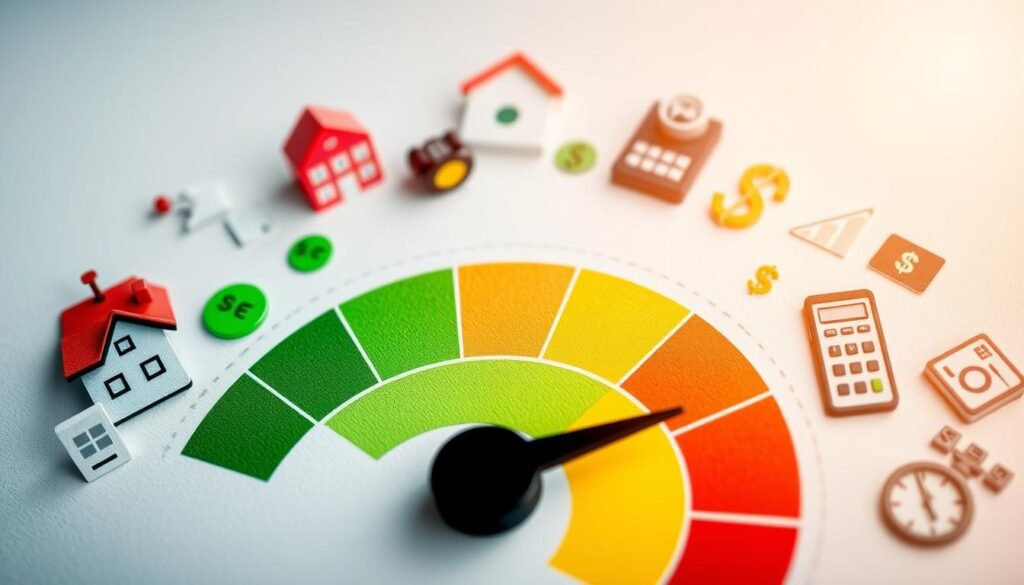This post may contain affiliate links, which means I may earn a commission if you purchase through these links at no extra cost to you
I remember spotting what felt like my dream home—it was in the perfect neighborhood and had everything I’d hoped for: a nice kitchen, a backyard where my family could play, a full finished basement. But then came the hard part—figuring out how to choose the right lender. I felt overwhelmed at first, but I quickly realized that finding the right lending partner could set the tone for a smoother, more confident home-buying journey.
Finding the right lender involves more than getting money for the house. It means knowing your finances, learning about mortgage options, and deciding what you value in a lender, like low rates or great customer service. Surprisingly, nearly half of homebuyers don’t look for better rates, losing potential savings. By considering various lenders, like direct lenders or online options, you can find the best fit for your budget.
It’s wise to meet with three to five lenders to understand what they offer. This shopping should happen within 45 days to protect your credit score. Getting just one more loan quote could save you $1,500 during the loan’s life. Those who get five quotes might save about $3,000. So, explore your options carefully and thoroughly.
Understanding the different types of lenders and comparing their offers can save you money. This can make buying a home easier and it can give you a clearer understanding of what lenders offer.
Table of Contents
ToggleUnderstanding Different Types of Lenders
Choosing the right mortgage lender is crucial. Different lenders have unique benefits and drawbacks. Knowing the main categories is essential.

Direct Lenders
Companies like Quicken Loans are direct lenders. They manage your mortgage from start to finish. Direct lenders offer good rates and personalized service because they oversee your loan themselves.
Wholesale Lenders
Wholesale lenders work with third parties, like mortgage brokers, to offer loans. They don’t usually meet borrowers but still provide good rates. Choosing wholesale lenders can be smart if you want more loan choices or if your credit isn’t great.
Credit Unions
Credit unions are owned by their members and often have better mortgage rates than traditional banks. But, you must qualify for membership to use their services. They’re known for great service and putting customers first.
Online Mortgage Companies
Online mortgage companies like Rocket Mortgage make applying for loans easy. They use digital platforms to speed up approval times and usually offer lower rates. These lenders are perfect for those who prefer doing things online and want quick results.
Mortgage Brokers
Mortgage brokers help you find the best mortgage rates and terms. They save you time and possibly money. But, they usually charge a fee, which might increase your loan costs.
Conventional Banks
Conventional banks, like Wells Fargo, provide a wide range of financial services along with mortgages. They’re great for those who like in-person service and already bank with them. However, they might have tougher loan requirements and longer approval times.
| Type of Lender | Strengths | Potential Drawbacks |
|---|---|---|
| Direct Lenders | Competitive rates, personalized service | Potential for less flexibility in loan options |
| Wholesale Lenders | Competitive rates, more loan options | No direct contact with borrowers |
| Credit Unions | Better rates, personal service | Membership requirements |
| Online Mortgage Companies | Fast approval, lower interest rates | Lack of face-to-face interaction |
| Mortgage Brokers | Access to various lenders, potentially better rates | Service fees, additional costs |
| Conventional Banks | Stability, comprehensive services | Stricter lending guidelines, longer approval process |
“Choosing the right mortgage lender requires understanding the unique benefits and potential drawbacks each type of lender offers.”
Understanding direct lenders, wholesale lenders, credit unions, online mortgage companies, mortgage brokers, and conventional banks helps you make a better choice. You can pick the best lender for your needs.
Factors to Consider When Comparing Lenders
Finding the right mortgage lender is key. It’s important to know what makes each one different. Think about the mortgage rates, fees, loan terms, and how each lender treats their customers.
Mortgage Rates
Mortgage rates affect your loan’s cost over time. Freddie Mac shows rates can differ by up to 0.22%. So, comparing rates from at least three to five lenders could save you about $3,000.

Loan Fees and Closing Costs
Loan fees and closing costs are key factors too. Costs like origination and application fees can vary a lot. It’s wise to understand these fees upfront to avoid surprises later.
Loan Types and Terms
The type and terms of loans are important. Some lenders offer special programs like FHA loans or USDA loans. They might affect your credit score differently too.
Customer Service and Support
Good customer service is essential. You can learn about a lender’s service from online reviews or real estate agents. Proper licensing also shows a lender’s credibility. Great service makes the mortgage process smoother.
Importance of Your Credit Score in Choosing a Lender
Your credit score is vital when applying for a mortgage. It affects the loan terms you get. Lenders look at your credit score and history to judge your financial health. A good credit score means better interest rates and loan terms.

How Credit Scores Impact Loan Offers
Lenders use your credit score to decide on your loan’s interest rates and terms. If your score is over 720, you’re in line for the best home loan rates. But a lower score could mean paying more in interest. For instance, getting a conventional mortgage is cheaper if your score is high. Meanwhile, FHA loans are more forgiving but might cost you more. VA loans are also an option, especially for military members with lower scores.
A tiny difference in interest rates can make your monthly payments much higher. This means you’ll pay more over the loan’s life. That’s why your credit score is key when looking at loan offers. Shopping around with different lenders can help you snag lower rates. This move could save you a lot over time.
Steps to Improve Your Credit Score Before Applying
Boosting your credit score before applying for a mortgage is smart. It can get you better loan terms. Here are steps to improve your credit score:
- Pay bills on time: On-time payments help keep your credit history positive.
- Lower credit utilization: Try to keep your credit card balances low compared to limits.
- Correct errors on your credit report: Check your credit report regularly and fix mistakes.
- Consider a secured credit card: A card like the OpenSky® Secured Visa® Credit Card can boost your score in six months.
Improving your credit score is proactive and beneficial. It affects your mortgage approval and the deals you get. By taking these steps, home buying becomes easier and more budget-friendly.
Getting Preapproved for a Mortgage
Getting a mortgage preapproval is crucial when buying a home. It shows sellers you’re a serious buyer with solid financial backing. Companies like Rocket Mortgage make it easy to get preapproved online.
Documents Needed for Preapproval
You’ll need to collect some key documents for your home loan application. This list usually includes:
- Two years of tax returns
- Recent pay stubs
- Bank statements and investment account statements
- Social security number
- Information on outstanding debt obligations
Benefits of Getting Preapproved
Preapproval offers several advantages that improve your house hunting:
- Stronger Buying Position: Shows sellers you mean business.
- Accelerated Buying Process: Helps speed up the application for your dream home.
- Clear Budget Understanding: You’ll know how much house you can afford, avoiding time wasted on places out of reach.
It also allows you to shop around for the best mortgage rates and terms from various lenders.
Start preparing your documents early. This will give you a good start in the home-buying process. Being well-prepared helps you move towards buying your dream house confidently.
Questions to Ask Potential Lenders
Looking for a mortgage can be tough. Asking the right lender questions is key to a smart choice. Focus on these important things when you talk to lenders:
Fee Structures and Hidden Costs
Costs between lenders can really differ, so ask about fees early on. Find out about origination, appraisal fees, and any hidden costs. Knowing if there are charges for rate lock-in or escrow accounts can avoid surprises later.
Loan Servicing and Customer Care
Excellent mortgage service is essential for a smooth buying experience. Find out how lenders handle loan servicing and the support they offer. Learn about their ways of communication and dealing with issues after closing. This insight will show you the support level throughout your loan’s life.
Turnaround Time and Rate Locks
How fast a lender works can impact your home buying and closing. Ask about their processing time for approvals and closings. Also, see how they handle interest rate locks to protect against rate changes. Some might charge for this, so ask about the costs involved.
The Role of Down Payments and Mortgage Insurance
Understanding down payments and mortgage insurance is key in the home buying journey. These factors shape your loan conditions and the costs of buying a home. Knowing their roles and impact is vital.
Down Payment Requirements
Down payments are essential in getting a mortgage. They are a part of the home’s price you pay upfront. A bigger down payment has many benefits:
- Lower monthly mortgage payments
- Improved interest rates
- Better chances of loan approval
- Potentially smaller home buying costs long term
Lenders see a big down payment as a sign of savings and commitment. If you can, a 20% down payment avoids Private Mortgage Insurance (PMI). But, it’s key to not use all your savings.
Understanding Private Mortgage Insurance (PMI)
PMI is needed if your down payment is below 20% of the home’s price. It protects the lender if you can’t pay the mortgage. While PMI increases your costs, it helps those with smaller down payments get a loan.
Some important points about PMI:
- The cost of PMI varies from 0.3% to 1.5% of the loan each year.
- PMI payments are typically part of your monthly mortgage payment.
- You can cancel PMI after gaining 20% equity in your home.
It’s crucial to understand these aspects and talk to your loan officer. Think about different situations and their long-term effects on your finances.
| Factors | Impact on Mortgage |
|---|---|
| Down Payment Size | Improves loan approval chances, reduces PMI, lowers monthly payments, affects interest rates |
| PMI Requirement | Increases monthly mortgage costs, protects lender, removable upon reaching 20% equity |
| Home Buying Costs | Includes down payment and PMI, varies with loan amount and loan terms |
The Importance of Reading the Fine Print
Understanding the fine print in mortgage agreements is key. It ensures you make an informed decision. Carefully check all documents before signing. This helps you understand important details. These include interest rates, repayment terms, and penalties.
It’s important to know the type of interest rate you’re getting. Fixed rates mean your payments stay the same. Variable rates can change, affecting your monthly payments. Be on the lookout for hidden fees like processing or origination charges. These can increase your loan’s cost over time. Surprisingly, only about 77% of borrowers check with a single lender. Those who get quotes from multiple lenders often spend less on closing costs.
Taking time to understand your loan aligns with your financial goals. For example, late payments can hurt your credit, making future loans cost more. Make sure your lender is clear and helpful with any questions.



